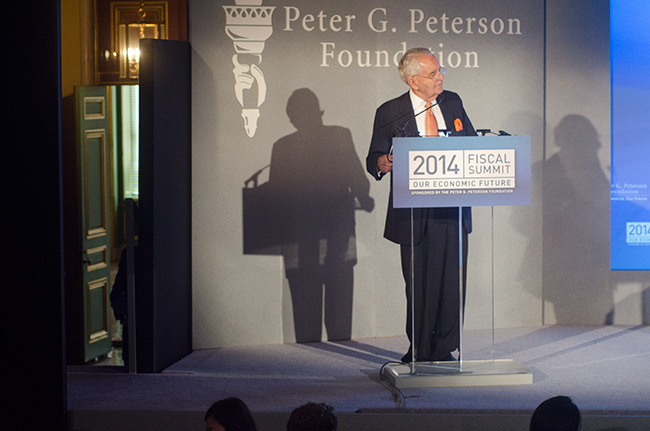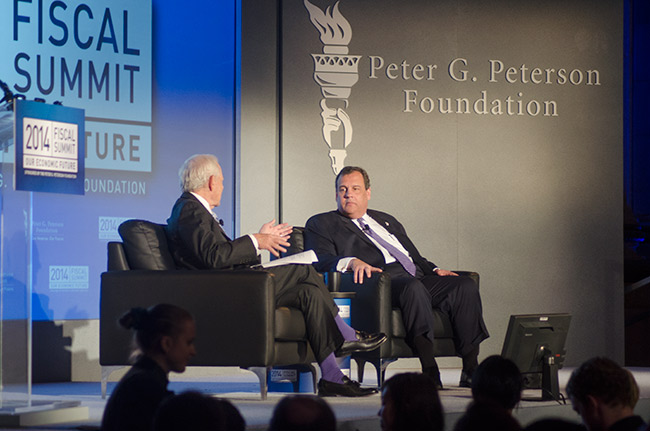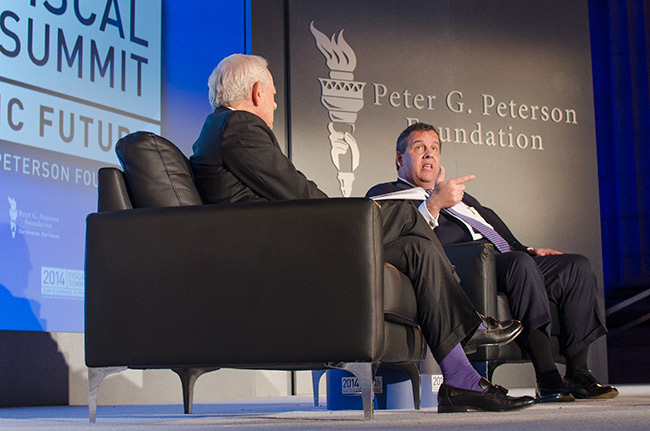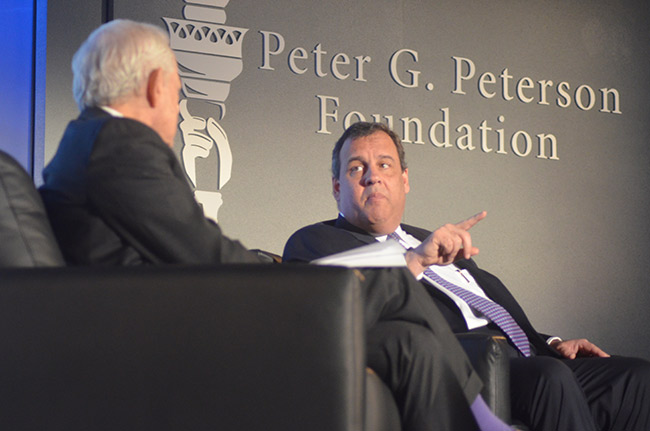| Peter G. Peterson Foundation 2014 Fiscal
Summit ...3 of 3 > |
 |
| May 14, 2014 - Peter G. Peterson
introduced Gov. Chris Christie (R-NJ) praising hims as "a straight
talker, but more than that you combine with being a very effective
doer; you tackle the tough issues, you know how to reach across the
aisle." |
 |
| Bob Schieffer, CBS
News'
chief
Washington correspondent and moderator of "Face the Nation"
interviewed Christie for about 25 minutes. Schieffer started with
a tough question, asking, "...Now suddenly
the news is not so good about New Jersey. You're facing a
shortfall in your budget of $807 million, credit rating was recently
downgraded again, there's concern the state will be unable to make its
pension payments, you've got low job growth when compared to some other
states. So I guess I'll just begin a general question.
Where do you start? Can you fix this and can you do all of it at
once or where do you set your priorities from here on?"
Gov. Christie went right into the details of the budget situation in
New
Jersey."Well you know I think as I said
in those comments, I made it really clear that the comeback we've made
has been exceptional but not complete, and the other thing that I've
been talking about in parallel tracks is, is the fact that our
entitlement spending—and at the state level that's pension, health
benefits and debt service—in my fiscal year '15 budget that takes 94
cents of every new dollar. So when you talk about wanting to
invest in higher eduction or K-12 education, if you talk about wanting
to invest in infrastructure, that all has to come out of that six
cents, and it's not sustainable. So we've made some great strides
on pension reform and on public health benefit reform, but I've been
saying now for the last year and during the campaign in 2013 for
re-election that we needed to do more. And I said the chickens
are going to come home to roost.
"Now the only surprise in what you just stated is that it's happened so quickly. Now there's a whole bunch of reasons for that that are technical in nature. Part of it in a state like ours that has such, an income tax system that is so heavily stratified to the top taxpayers, that when here in Washington they raised the taxes in 2012 lots of people accelerated their income, capital gains and others, into that 2012 year to avoid the federal tax increase in '13, and our economists underestimated what the effect that would be on the 2013 tax year, and it was a big one. In the month of April alone in New Jersey they overestimated our revenue by $650 million, for the month of April. "So you know we've got to deal with that problem. I'll come out next week with a plan on how to deal with it. But the long-term problem here is that in fiscal year '16, I'll give you one example: New Jersey will pay more for retiree health benefits than we'll pay for active employees. It's just not sustainable. "And so I'm trying in the last five years to fix problems that we've accumulated over the last twenty. Good news and bad news. The bad news is I have to try to do it, and it's never fun, but the good news is we know it and we're going to either choose to confront it or not, and that's where I'm going to have to deal with the Democratic legislature." Schieffer and Christie continued discussing the budget and pensions, but Christie declined to get into the specifics of his plan until next week. Asked about the minimum wage, Christie said he had favored an increase of $1.25 phased in over three years. The legislature wanted to do it in "one fell swoop" and put the matter on the Nov. 2013 ballot as a constitutional amendment, which voters approved. Schieffer asked whether Bridgegate "is going to have an impact on your being able to meet these budget challenges with the legislature and what do you think the impact has been on your political future?" Christie responded, "Well, no it won't have any
impact upon, upon the budget problems because we have a constitutional
requirement to fix them. So if the legislature, because they're
holding hearings on something, want to waive the constitutional
requirement on a balanced budget, that will be an interesting
trick. So I don't think, no. And as far as the impact on my
political future, I think it will have none 'cause I didn't do
anything.
Schieffer followed on that, asking, "Are you still thinking about
running for president and when will you make a decision?""So I understand the circus that this becomes. You know you get 61% of the vote in a blue state in November, and then all of the sudden you know a couple of staff people do something that they shouldn't have done. I fire them, and all of the sudden this becomes the biggest story in the country for a couple of months, 'cause I guess you guys we're doing anything else down here so this is what needed to be focused on, right? "In the end what the people of New Jersey know about me is I tell them the truth. I told them I had nothing to do with it, and now you've had all kinds of people looking at this for nearly 4 1/2 months now and there hasn't been one suggestion that I knew anything about it. I am not the first chief executive—I see Gov. Engler down here, I saw President Clinton back stage before—I'm not the first chief executive who had someone on their staff do something that they didn't know something about, that they disapproved of and later had to fire them. I don't think that that hurt anybody's career and it's not going to hurt mine. "I mean you know my future is going to be based upon the record that Mr. Peterson talked about and how people in the state feel about me and if I decide to do something more it's going to be how the people of the country feel about me, but I think this will be a footnote by the time any of those decisions need to be made." Christie was concise, "Yes, and later."
Schieffer asked what the effect would be if Republicans win control of
the Senate in 2014. His final question produced an interesting
response. He asked, "What do you think, when you get right down
to the bottom of it, why has Washington become so unable to get
anything done anymore? Because I see now sometimes when there are
things that both sides want to get done, they can still figure out a
way not to do it; something happens that gums it up. What advice
would you have to either side, the Republicans or the president, to
break this and get things going again."Christie answered, "Well listen, I can only
analogize into my experience in New Jersey. And I've had a
Democratic legislature my entire time, and not by a small amount.
24-16 in the Senate, 48-32 in the lower house, so it's not like I pick
a vote off here and there and I'm okay. You know I'm working with
Democratic leaders in the legislature on everything that we have to get
done.
"I think the first thing is that nobody has relationships in this town anymore. Every time the Democratic Senate president is in the State House and I'm there, we meet. Every time. Sometimes it's five minutes. He comes in and we chat about the games the night before or the gossip around the State House or whatever is going on, and, "Do you have anything?" "No I don't have anything." "I don't have anything. Okay." and he leaves. Sometimes it's hour or two-hour meetings about substance. Sometimes it's two hour meetings that devolve into dinner. "But what happens is we get to know each other, and we get to trust each other because we're both good people. All right, we disagree on lots of stuff but we're good people at core, and when you sit and spend that much time with someone you get to learn that or not, and luckily in my case I've learned that he is a really good person. And what that then leads to is when he gives me his word on something I can count on it, and when I give him my word, he knows he can count on it. That's the only way business gets done in politics. "If you don't know each other, you don't trust each other; if you don't trust each other, you can't make deals; if you can't make deals, you can't get anything done. That's it. And I don't think this is a president who's ever been interested in having those relationships, with either party. I just don't see any objective evidence that the president wants to have those relationships with members of Congress. 'Cause it's hard. Believe me there are times I meet with some folks in the legislature that I'd rather have a root canal. Right, I mean seriously, there are some people I have to deal with that I don't like. But it's my job. If I don't deal with them, they'll ignore me, I'll ignore them, and we'll get nothing done. So I think that the problem starts with the president because he's the president. If you wait for leadership out of Congress your going to be waiting forever..." |
 |
 |
| next > |

